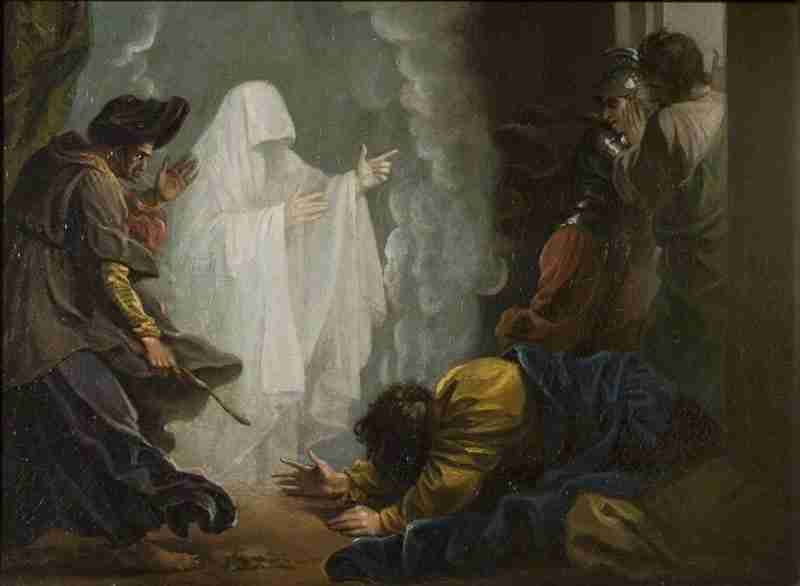Ultimately, the biblical perspective on psychics underscores the importance of seeking guidance from God.
The Bible teaches that God is the source of all wisdom and knowledge and generously guides those who seek Him.
In contrast, psychic practices often involve seeking knowledge and insight from outside of God, leading to spiritual confusion and deception.
Table of Contents
Understanding the Concept of Psychics in the Modern World
In today’s society, the term psychic often conjures images of crystal balls, tarot cards, and individuals with the ability to perceive information hidden from the normal senses.
These individuals, often referred to as psychics, mediums, fortune tellers, or clairvoyants, claim to have an intuitive understanding of the world that goes beyond our standard sensory perception.
They are believed to possess extrasensory perception (ESP), enabling them to predict future events, communicate with the deceased, or read people’s minds.
The Role of Psychics in Society
Psychics play various roles in different cultures and societies. Some people turn to psychics for guidance in decision-making, while others seek them out for spiritual comfort or to connect with loved ones who have passed away.
In some cultures, psychics are revered as spiritual leaders or advisors, providing counsel to those in need.
They are often seen as a bridge between the physical and spiritual realms, offering insights not readily available to the average person.
The Controversy Surrounding Psychics
Despite their prevalence, psychics are a subject of controversy and skepticism. Critics argue that psychic abilities lack scientific evidence and are often associated with fraud and deception.
On the same topic: Psychic vs. Medium: Understanding the Difference Between a Psychic and a Medium
Furthermore, religious groups, particularly Christians, often express concerns about the spiritual implications of consulting psychics. They argue that these practices conflict with biblical teachings, which warn against seeking spiritual guidance outside of God.
This controversy forms the basis of our exploration into what the Bible says about psychics, mediums, fortune tellers, and clairvoyants.

What Does the Bible Say About Psychics?
The Bible, a cornerstone of the Christian faith, offers a perspective on these individuals and their practices.
The questions, “What does the Bible say about psychics?”, “What does the Bible say about mediums?”, “What does the Bible say about fortune tellers?” and “What does the Bible say about clairvoyants?” are often asked, and the answers are found in the pages of this sacred text.
Biblical Verses on Psychics and Mediums
Several verses in the Bible directly address the issue of psychics and mediums.
For instance, Leviticus 19:31 warns:
Do not turn to mediums or seek out spiritists, for you will be defiled by them. I am the LORD your God.
Similarly, Deuteronomy 18:10-12 states:
Let no one be found among you who sacrifices their son or daughter in the fire, who practices divination or sorcery, interprets omens, engages in witchcraft, or casts spells, or who is a medium or spiritist or who consults the dead. Anyone who does these things is detestable to the LORD.
These verses suggest a clear biblical perspective on psychics and mediums. They are seen as detestable practices and defiling, leading people away from God’s guidance.
However, it’s important to remember that the Bible’s teachings are part of a larger cultural and historical context and reflect the beliefs and values of the time and place in which they were written.
The Consequences of Consulting Psychics According to the Bible
The Bible not only discourages the practice of psychic abilities but also warns of the consequences of engaging with them.
In 1 Chronicles 10:13-14, we read about the downfall of King Saul, who died because he was unfaithful to the LORD and did not keep the word of the LORD, and even consulted a medium for guidance, and did not inquire of the LORD. Therefore, the LORD put him to death and turned the kingdom over to David, the son of Jesse.
This biblical account serves as a warning to those considering consulting psychics or mediums. The Bible suggests these practices can lead to spiritual downfall and separation from God’s favor.
Recommended read: What is a Poltergeist? A Complete Guide to Understanding Violent Paranormal Disturbances
In today’s society, the term psychic often conjures images of crystal balls, tarot cards, and individuals with the ability to perceive information hidden from the normal senses.
These individuals claim to intuitively understand the world beyond our standard sensory perception.
However, they play various roles in different cultures and societies. Some people turn to them for guidance in decision-making, while others seek them out for spiritual comfort or to connect with loved ones who have passed away.
In some cultures, they are revered as spiritual leaders or advisors, providing counsel to those in need.
The Clash Between Faith and Psychic Practices
The intersection of faith and psychic practices often results in a clash of beliefs and values.
This conflict arises from the fundamental differences between the Christian faith and the practices of psychics, mediums, fortune tellers, and clairvoyants.
While the Christian faith emphasizes reliance on God and His Word for guidance and wisdom, psychic practices often seek knowledge and insight from sources outside of God, which is seen as a form of divination.
Related: Hinton Ampner Haunting: Investigating a Bizarre Poltergeist Manifestation
However, it’s important to remember that not all individuals who consult psychics or mediums do so with the intention of divination. Many seek comfort, guidance, or a sense of connection to something larger than themselves.
The Christian View on Psychic Abilities
In the modern era, the Church upholds biblical teachings regarding psychics, mediums, fortune tellers, and clairvoyants. The consensus among most Christian denominations is that these practices are incompatible with Christian faith and teachings.
Divination involves uncovering hidden knowledge or predicting future events through supernatural means, seen as an attempt to usurp God’s sovereignty and wisdom.
In addition, the Bible teaches that our knowledge and understanding should come from God and His Word.
James 1:5 says:
If any of you lacks wisdom, you should ask God, who gives generously to all without finding fault, and it will be given to you.”
This verse suggests that Christians should seek wisdom and understanding directly from God, rather than relying on psychic abilities or other forms of divination.
However, it’s worth noting that the world is diverse, filled with many beliefs and practices.
While the Church may discourage these practices, many individuals find value and comfort in them. It’s a reminder that spirituality is a deeply personal journey that can take many forms.
Biblical Accounts Related to Psychic Practices
The Bible provides several accounts about psychic practices, offering valuable insights into the Biblical perspective.
Two notable examples include the story of Saul and the Witch of Endor and the account of Simon the Sorcerer.

Saul and the Witch of Endor
The story of Saul and the Witch of Endor, found in 1 Samuel 28:3-25, serves as a cautionary tale about the dangers of consulting mediums.
In this account, King Saul, desperate for guidance during a time of war, seeks out a medium in Endor after God did not answer his prayers. At Saul’s request, the medium brings forth the spirit of the prophet Samuel.
However, instead of providing the guidance Saul sought, Samuel rebukes Saul for his disobedience to God and predicts Saul’s impending defeat and death.
This story ends tragically, with Saul falling on his sword and dying after his defeat in battle.
This account warns about the consequences of consulting mediums and turning away from God. It illustrates the biblical teaching that seeking guidance from mediums can lead to spiritual downfall and separation from God’s favor.
Simon the Sorcerer
The account of Simon the Sorcerer, found in Acts 8:9-24, provides another perspective on the intersection of faith and psychic practices.
Simon, a sorcerer in Samaria, was known for his impressive magical performances, leading many to believe he had divine power.
However, when Simon witnessed the miracles performed by Philip the Evangelist through the power of the Holy Spirit, he believed in Jesus and was baptized.
Despite this, Simon attempted to buy the power of the Holy Spirit, hoping to perform similar miracles. Peter rebuked Simon for his misunderstanding of the nature of God’s power and his attempt to manipulate it for his own gain.
This account highlights the difference between the power of God and the practices of psychics and sorcerers.
It underscores the biblical teaching that God’s power cannot be bought or manipulated, and that attempts to do so reflect a misunderstanding of the nature of faith.
The Church’s Stance on Psychics Today
Many Christian leaders warn about the dangers of psychic practices. They argue that these practices can lead to spiritual deception, as they open individuals up to spiritual realms without the protection and guidance of God.
Furthermore, they caution that psychics and mediums often provide vague and ambiguous predictions that can lead to confusion and misinterpretation.
You may also like: Is Annabelle Based on a True Story?
Christian leaders also expressed concern about the potential for exploitation. They note that individuals seeking guidance or comfort may be vulnerable and susceptible to manipulation.
This concern is particularly relevant given the lack of regulation in the psychic industry and the numerous reports of fraud and deception.
Frequently Asked Questions
What does the Bible say about consulting psychics?
The Bible generally discourages consulting psychics. Verses such as Leviticus 19:31 and Deuteronomy 18:10-12 warn against turning to mediums or spiritists, stating that these practices are detestable to the Lord. The Bible encourages believers to seek guidance directly from God and His Word.
Are there any instances of psychic-like phenomena in the Bible?
While the Bible does not explicitly mention psychic phenomena as we understand it today, there are instances of supernatural knowledge and prophecy.
However, these instances are attributed to the power of God rather than individual psychic abilities. For example, the prophets in the Bible received visions and revelations from God, but these were seen as divine gifts rather than personal abilities.
How should Christians respond to the concept of psychics and mediums?
Christians are encouraged to approach the concept of psychics and mediums with discernment and caution. The Bible warns against these practices and encourages believers to seek wisdom and guidance from God. Christians are called to test the spirits to see whether they are from God (1 John 4:1) and to rely on God’s Word as the standard for truth.
Can a Christian have psychic abilities?
The Bible does not explicitly address the concept of Christians having psychic abilities. However, it does warn against practices associated with psychics, such as divination and communicating with the dead.
Instead of focusing on psychic abilities, the Bible encourages believers to seek and use spiritual gifts for the edification of the Church and the glory of God.
What is the Church’s stance on psychic practices today?
The Church generally discourages psychic practices, aligning with the biblical warnings against such practices. Most Christian denominations view these practices as incompatible with Christian faith and teachings.
Christian leaders warn about the potential spiritual dangers of consulting psychics and encourage believers to seek guidance and wisdom from God and His Word.
Sources
- What does God say about channeling and mediums? Bibleinfo. [Source]
- Does the Bible take a position on clairvoyance and parapsychology? gty.org.
- What Does the Bible Say About Psychics? openbible.info.
- Dan Kassis – What does the Bible say about witches, ghosts, psychics, and mediums? medium.com.




